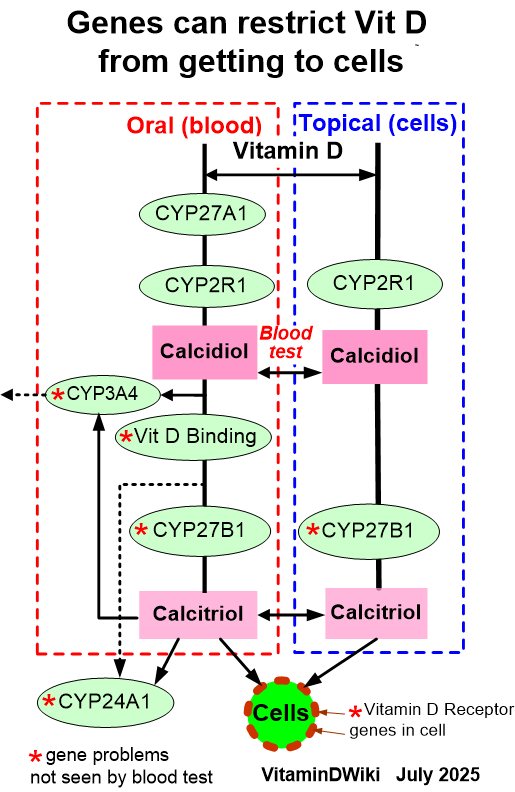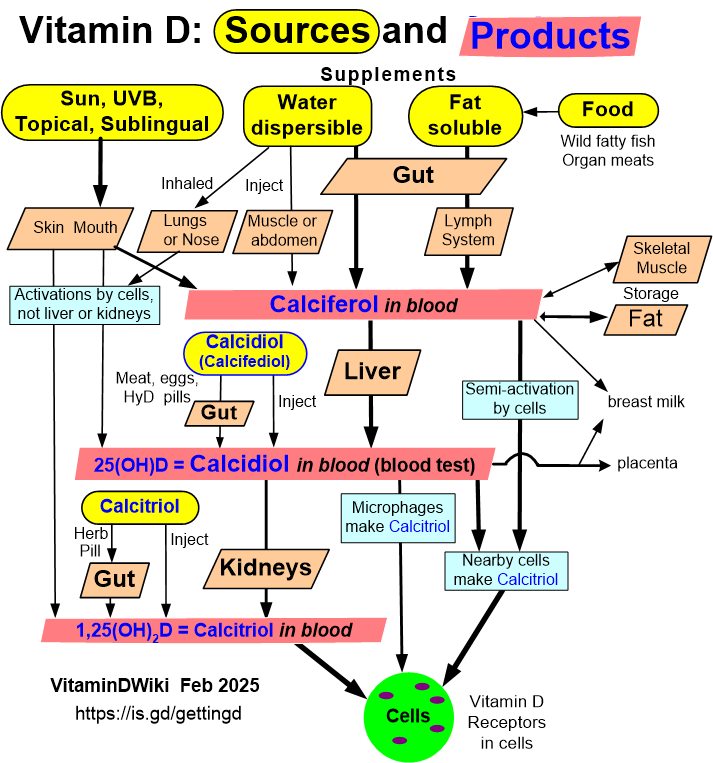Active Vitamin D reduces Ovarian Cancer stem cells growth by 4X (via Vitamin D receptor in lab rat)
Depleting ovarian cancer stem cells with calcitriol.
Oncotarget. 2018 Feb 16;9(18):14481-14491. doi: 10.18632/oncotarget.24520. eCollection 2018 Mar 6.
Srivastava AK#1,2, Rizvi A#1,3, Cui T1, Han C1, Banerjee A1,4, Naseem I3, Zheng Y5, Wani AA1, Wang QE1.
 * click on image for details
* Did not notice if this study indicated how much Calcitril wa sneeded to get the 4X reduction
---
* Vitamin D and Prevention of Cancer — Is it ready for Prime Time – March 2011
* Cancer risk reduced 65 percent by vitamin D levels greater than 40 nanograms – April 2016
* Evidence that Vitamin D prevents Cancer – Grant Feb 2018
* Overview Cancer and vitamin D has the following chart
*
* click on image for details
* Did not notice if this study indicated how much Calcitril wa sneeded to get the 4X reduction
---
* Vitamin D and Prevention of Cancer — Is it ready for Prime Time – March 2011
* Cancer risk reduced 65 percent by vitamin D levels greater than 40 nanograms – April 2016
* Evidence that Vitamin D prevents Cancer – Grant Feb 2018
* Overview Cancer and vitamin D has the following chart
*  * * Calcitriol category listing has items along with related searches**
---
1. Cancer category starts with the following
{include}
---
1. Getting Vitamin D into your blood and cells has the following chart
* * Calcitriol category listing has items along with related searches**
---
1. Cancer category starts with the following
{include}
---
1. Getting Vitamin D into your blood and cells has the following chart
 click on image for details
click on image for details
📄 Download the PDF from VitaminDWiki


Cancer stem cells (CSCs) represent the root of many solid tumors including ovarian cancer. Eradication of CSCs represents a novel cancer therapeutic strategy. Calcitriol, also known as 1,25-dihydroxyvitamin D3 [1,25(OH)2D3], is an active metabolite of vitamin D, functioning as a potent steroid hormone. Calcitriol has shown anti-tumor effects in various cancers by regulating multiple signaling pathways. It has been reported that calcitriol can regulate the properties of normal and CSCs. However, the effect of calcitriol on the ovarian cancer growth and ovarian CSCs is still unclear.
Here, by using a mouse subcutaneous xenograft model generated with human ovarian cancer cells, we have demonstrated that administration of calcitriol is able to strikingly delay the tumor growth.
Calcitriol treatment can also
deplete the ovarian CSC population characterized by ALDH+ and CD44+CD117+;
decrease their capacity to form sphere under the CSC culture condition, and
reduce the frequency of tumor-initiating cells, as evaluated by in vivo limiting dilution analysis.
Mechanistic investigation revealed that calcitriol depletes CSCs via the nuclear vitamin D receptor (VDR)-mediated inhibition of the Wnt pathway.
Furthermore, the activation of VDR pathway is more sensitive to calcitriol in ovarian CSCs than in non-CSCs, although the expression levels of VDR are comparable.
Taken together, our data indicate that calcitriol is able to deplete the ovarian CSC population by inhibiting their Wnt signaling pathway, consequently, impeding the growth of xenograft tumors.
PMID: 29581858 PMCID: PMC5865684 DOI: 10.18632/oncotarget.24520
